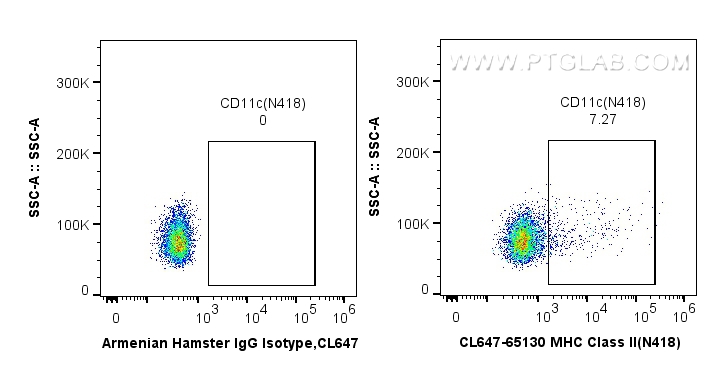验证数据展示
经过测试的应用
| Positive FC detected in | mouse splenocytes |
推荐稀释比
| 应用 | 推荐稀释比 |
|---|---|
| Flow Cytometry (FC) | FC : 0.5 ug per 10^6 cells in 100 μl suspension |
| This reagent has been tested for flow cytometric analysis. It is recommended that this reagent should be titrated in each testing system to obtain optimal results. | |
| Sample-dependent, Check data in validation data gallery. | |
产品信息
CL647-65130 targets CD11c in FC applications and shows reactivity with mouse samples.
| 经测试应用 | FC Application Description |
| 经测试反应性 | mouse |
| 免疫原 |
Mouse spleen dendritic cells 种属同源性预测 |
| 宿主/亚型 | Armenian Hamster / IgG |
| 抗体类别 | Monoclonal |
| 产品类型 | Antibody |
| 全称 | integrin alpha X |
| 别名 | Itgax, Cr4, integrin alpha X, N418 |
| GenBank蛋白编号 | BC167225 |
| 基因名称 | CD11c |
| Gene ID (NCBI) | 16411 |
| RRID | AB_2883698 |
| 偶联类型 | CoraLite® Plus 647 Fluorescent Dye |
| 最大激发/发射波长 | 654 nm / 674 nm |
| 形式 | Liquid |
| 纯化方式 | Affinity purification |
| UNIPROT ID | Q9QXH4 |
| 储存缓冲液 | PBS with 0.09% sodium azide and 0.5% BSA, pH 7.3. |
| 储存条件 | Store at 2-8°C. Avoid exposure to light. Stable for one year after shipment. |
背景介绍
Integrins are cell adhesion receptors that are heterodimers composed of non-covalently associated α and β subunits (PMID: 9779984). CD11c, also known as integrin αX, is a type I transmembrane glycoprotein present on a variety of cells, including monocytes/macrophages, granulocytes, a subset of B cells, NK cells and dendritic cells (PMID: 2897326; 1680915; 1694698; 17389580). As a result of its high level of expression on most dendritic cells, CD11c is typically considered to be a marker of conventional dendritic cells (PMID: 27119555). CD11c forms an α/β heterodimer with CD18 (integrin β2). CD11c/CD18 acts a receptor for fibrinogen and is important in monocyte adhesion and chemotaxis (PMID: 1671533).
实验方案
| Product Specific Protocols | |
|---|---|
| FC protocol for CL Plus 647 CD11c antibody CL647-65130 | Download protocol |
| Standard Protocols | |
|---|---|
| Click here to view our Standard Protocols |


